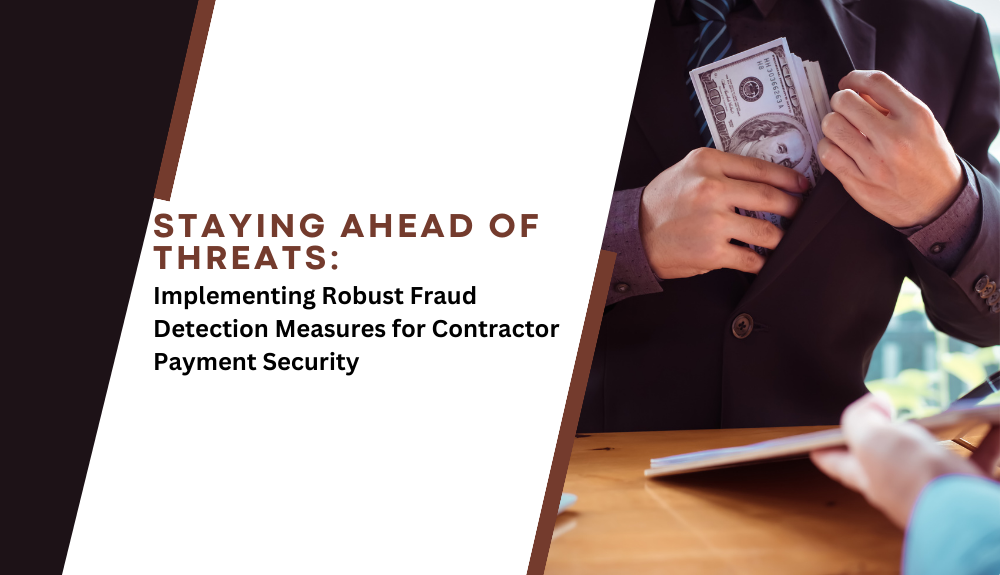Welcome to the world of contractor payment security, where staying ahead of threats is key to ensuring smooth operations and financial integrity. In today’s digital age, the risk of fraud looms large, making robust fraud detection measures a non-negotiable aspect of any business dealing with contractors. From sophisticated cyber scams to simple but effective schemes, contractor payment fraud can take various forms, posing a serious threat to organizations of all sizes. Let’s dive into the realm of combating these threats and safeguarding your payments against malicious actors.
Common Types of Contractor Payment Fraud
Contractor payment fraud comes in various forms, often catching businesses off guard. One common type is invoice manipulation, where a contractor inflates costs or bills for services not rendered. Another sneaky tactic is ghost employees, where fictitious workers are added to the payroll to siphon funds. Phishing scams targeting sensitive financial information are also prevalent among contractors.
Payment diversion schemes involve rerouting payments to fraudulent accounts instead of legitimate contractors. Shell company fraud occurs when fake companies are set up to receive payments for non-existent services. Collusion between employees and contractors can lead to kickbacks and inflated invoices.
It’s essential for businesses to stay vigilant and implement robust fraud detection measures to safeguard their contractor payments from these deceptive practices.
The Importance of Robust Fraud Detection Measures
Fraud detection measures are crucial for safeguarding contractor payments. By implementing robust systems, businesses can protect their financial assets and reputation. Detecting fraud early on can prevent significant losses and legal repercussions.
Having strong fraud detection measures in place also promotes trust among contractors. When they know that their payments are secure, they are more likely to continue working with the business. This helps maintain positive relationships and ensures smooth operations.
Furthermore, investing in fraud detection demonstrates a commitment to compliance and ethical business practices. It shows stakeholders that the organization takes security seriously and is proactive in addressing potential risks.
The importance of robust fraud detection measures cannot be overstated. Businesses must prioritize implementing comprehensive strategies to mitigate risks effectively and protect their financial interests.
Preventive Measures for Secure Contractor Payments

When it comes to ensuring secure contractor payments, implementing preventive measures is crucial. One key strategy is to establish clear payment terms and processes upfront, outlining expectations for both parties involved. This helps minimize misunderstandings and reduces the risk of fraudulent activities.
Another important measure is to conduct thorough background checks on potential contractors before engaging in any business transactions with them. Verifying their credentials and reputation can go a long way in preventing payment fraud down the line.
Setting up dual authorization processes for approving payments can add an extra layer of security. By requiring multiple individuals to sign off on transactions, you create a system of checks and balances that deters unauthorized or fraudulent payments.
Regularly reviewing financial statements and monitoring cash flows can also help detect any irregularities or discrepancies that may indicate potential fraudulent activity. Stay vigilant and be proactive in safeguarding your contractor payments against fraud risks.
Real-Life Examples of Successful Fraud Detection and Prevention Strategies
Real-life examples of successful fraud detection and prevention strategies serve as valuable lessons for businesses looking to safeguard their contractor payments. One notable case involved a construction company that implemented regular audits and spot checks on invoices submitted by contractors. By cross-referencing project documentation with payment requests, they were able to uncover discrepancies and flag potential fraudulent activities early on.
In another instance, a technology firm partnered with a third-party risk management service to conduct thorough background checks on all new contractors before engaging in any payment transactions. This proactive approach helped them identify high-risk vendors and prevent potential fraud schemes from taking place.
Additionally, a retail chain invested in employee training programs focused on recognizing red flags of fraudulent behavior among contractors. By empowering staff members at various levels to stay vigilant and report suspicious activities promptly, the company was able to detect and mitigate fraud risks effectively.
These real-life examples highlight the importance of staying proactive, leveraging resources like third-party services, conducting regular audits, and fostering a culture of awareness within an organization when it comes to combating contractor payment fraud.
Implementing a Strong Internal Control System
Implementing a strong internal control system is crucial for safeguarding contractor payments. By establishing clear policies and procedures, organizations can mitigate the risk of fraud. Assigning roles and responsibilities within the finance department ensures accountability at every level. Regular audits help in identifying any loopholes or irregularities in the payment process.
Segregation of duties is essential to prevent any single individual from having too much control over financial transactions. Implementing dual authorization processes adds an extra layer of security to payment approvals. Encouraging a culture of transparency and ethical behavior among employees fosters trust within the organization.
Training staff on fraud detection techniques equips them to identify suspicious activities early on. Conducting background checks on contractors before engaging in business further reduces risks associated with fraudulent behavior. Stay proactive in monitoring internal controls and adapt them as needed to stay ahead of potential threats.
Collaboration with Contractors for Enhanced Security

Collaborating with contractors is key to enhancing security in payment transactions. By fostering open communication and mutual trust, businesses can work together with contractors to implement robust fraud detection measures.
Contractors play a vital role in safeguarding sensitive information and ensuring secure payment processes. Building strong relationships based on transparency and accountability is crucial for detecting and preventing fraudulent activities.
Engaging contractors in regular training sessions on cybersecurity best practices can empower them to identify potential threats proactively. Encouraging them to report any suspicious activity promptly can further strengthen the overall security framework.
Establishing clear guidelines and protocols for verifying contractor identities and payment details is essential for mitigating risks associated with fraudulent transactions. Collaborative efforts between businesses and contractors create a united front against potential threats.
Together, businesses and contractors can establish a culture of vigilance that prioritizes security at every step of the payment process. Emphasizing the importance of collaboration ensures that all stakeholders are actively involved in maintaining a secure environment for financial transactions.
Leveraging Technology: The Role of Data Analytics in Detecting and Preventing Fraud
In today’s digital age, leveraging technology is paramount in detecting and preventing contractor payment fraud. Data analytics plays a crucial role in identifying unusual patterns or discrepancies that may indicate fraudulent activities. By analyzing large volumes of data efficiently, businesses can swiftly pinpoint suspicious transactions and take immediate action.
Through advanced algorithms and machine learning capabilities, data analytics tools can proactively detect potential threats before they escalate. These cutting-edge technologies offer real-time monitoring and alerts to alert financial teams of any anomalies in contractor payments. This proactive approach enables organizations to stay one step ahead of fraudsters who are constantly evolving their tactics.
By harnessing the power of data analytics, companies can enhance their fraud detection capabilities while minimizing false positives. These innovative solutions provide a comprehensive overview of payment activities, enabling businesses to identify trends and behaviors indicative of fraudulent behavior promptly.
As the threat landscape continues to evolve, embracing technological advancements like data analytics is essential for safeguarding contractor payment security effectively ensuring business continuity and reputation preservation.
Continuous Monitoring and Updating of Fraud Detection Measures
As the landscape of contractor payment fraud continues to evolve, it is crucial for businesses to stay vigilant and proactive in implementing robust fraud detection measures. Continuous monitoring and updating of these measures are paramount in staying ahead of threats and ensuring the security of contractor payments.
By regularly assessing potential vulnerabilities, collaborating closely with contractors, leveraging technology such as data analytics, and establishing a strong internal control system, organizations can significantly reduce their risk exposure to fraudulent activities. It is through these concerted efforts that businesses can safeguard their financial resources and maintain trust within their contractor relationships.
Remember: when it comes to combating fraud in contractor payments, prevention is always better than cure. Stay informed, stay proactive, and stay one step ahead of those who seek to exploit vulnerabilities for personal gain. By prioritizing security and implementing comprehensive fraud detection strategies, businesses can protect themselves against potential threats while fostering a culture of transparency and integrity in all financial transactions.
